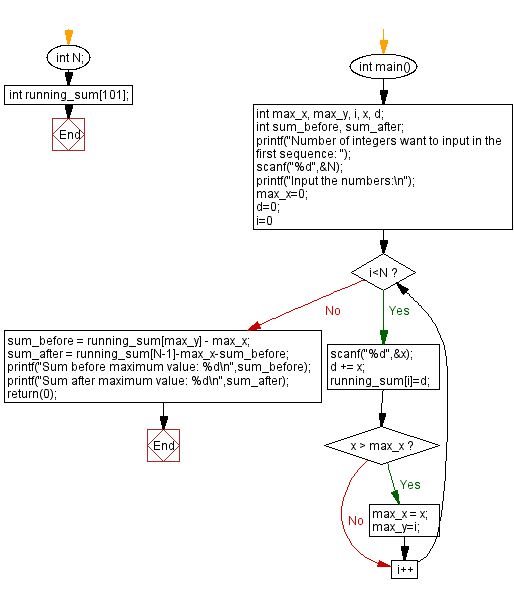C Exercises: Sum values before, after the maximum value in a sequence
5. Sum Before and After Maximum
Write a C program that accepts a sequence of different values and calculates the sum of the values before and after the maximum value.
The sum of the values before the maximum value is 0, if there are no values before the maximum. Similarly, the sum of the values after the maximum value is 0, if there are no values after the maximum.
Sample Date:
1 2 3 -> 3 0
1 2 9 4 5 -> 3 9
2 2 2 2 -> 0 6
C Code:
#include <stdio.h> // Include standard input/output library
int N; // Declare a variable 'N' to hold the number of integers
int running_sum[101]; // Declare an array 'running_sum' to store cumulative sums
int main()
{
int max_x, max_y, i, x, d; // Declare variables for maximum, iteration, input, and cumulative sum
int sum_before, sum_after; // Declare variables for sum before and after maximum value
// Prompt the user for the number of integers in the sequence
printf("Number of integers want to input in the first sequence: ");
// Read the input and store it in 'N'
scanf("%d", &N);
// Prompt the user to input numbers for the sequence
printf("Input the numbers:\n");
max_x = 0; // Initialize 'max_x' to 0 for comparison
d = 0; // Initialize 'd' to 0 for cumulative sum
// Loop to read integers, calculate cumulative sum, and find maximum
for (i = 0; i< N; i++)
{
// Read an integer from the user
scanf("%d", &x);
d += x; // Update cumulative sum 'd'
running_sum[i] = d; // Store cumulative sum in 'running_sum' array
// Check if the current input is greater than current maximum
if (x >max_x)
{
max_x = x; // Update maximum value
max_y = i; // Store index of maximum value
}
}
// Calculate sum before maximum value
sum_before = running_sum[max_y] - max_x;
// Calculate sum after maximum value
sum_after = running_sum[N - 1] - max_x - sum_before;
// Print the sum before maximum value
printf("Sum before maximum value: %d\n", sum_before);
// Print the sum after maximum value
printf("Sum after maximum value: %d\n", sum_after);
// Return 0 to indicate successful program execution
return(0);
}
Output:
Number of integers want to input in the first sequence: 5 Input the numbers: 1 2 9 4 5 Sum before maximum value: 3 Sum after maximum value: 9
Flowchart:

For more Practice: Solve these Related Problems:
- Write a C program to identify the maximum value in an array and then compute the cumulative sums of elements preceding and following it.
- Write a C program to scan a sequence of integers, determine the index of the maximum element, and print the sum of elements on either side.
- Write a C program to use pointer arithmetic to calculate and display the sum of values before the first occurrence and after the first occurrence of the maximum value.
- Write a C program to dynamically store integers, locate the maximum element, and then output the separate totals of the segments before and after it.
Go to:
PREV : Intersection of Two Sequences.
NEXT : Longest Ascending Contiguous Subsequence.
C Programming Code Editor:
What is the difficulty level of this exercise?
Test your Programming skills with w3resource's quiz.
